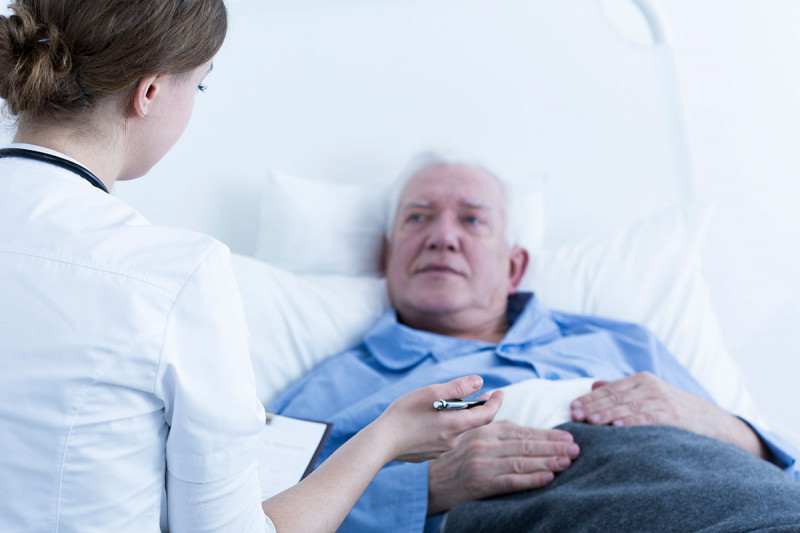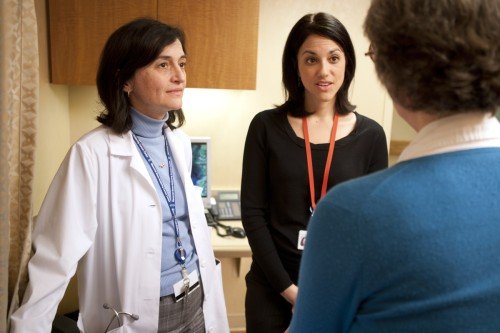
Patients in the hospital often stay in bed for long periods, even when it’s not necessary, says Armin Shahrokni.
Memorial Sloan Kettering geriatrician and medical oncologist Armin Shahrokni researches ways to ease the burdens that older people endure during cancer treatment. In an interview, he describes the importance of finding ways to help these patients better manage the experience.
How can doctors help older people with cancer do better during and after cancer treatment?
One important way is to keep them healthy enough to stay out of the hospital. I don’t like my older patients to be admitted to the hospital. Whenever a patient of mine goes into a hospital, they are at a very high risk for further loss of their physical and mental ability. It’s not just because their cancer has become more advanced or the treatment isn’t working. It’s because they’re in an unfamiliar bed, sleeping poorly, with constant noise, often sharing a room with a stranger, and being woken throughout the night to take vital signs.
Patients in the hospital often stay in bed for long periods, even when it’s not necessary, which causes them to lose muscle mass. Here at MSK, we make efforts to get them up and moving when possible. But we should continue to do better. We should use such services as physical and occupational therapy more frequently for older people.
By the time older people with cancer are discharged, they are more likely to be weaker and more exhausted. They were usually on multiple medications before their hospital stay, and while they are in the hospital, some medications may be added and others stopped. Despite pharmacists’ great efforts, older patients and their caregivers need to keep track of everything by themselves. An antidepressant that was stopped in the hospital may lead to worsening of depression after the patient goes home if their doctor doesn’t know it needs to be prescribed again. For older patients, it doesn’t take much to cause problems that worsen their already frail condition.
What is the most important factor in preventing older people with cancer from needing to go back in the hospital?
Probably the most important element is making it easier for patients to report their symptoms to their doctor. After treatment, follow-up appointments with a doctor typically last only ten to 15 minutes. It’s hard to get a clear assessment of their condition in that time. When people are at home, they are dealing with side effects 24 hours a day.
It’s critical for doctors to know about any symptoms and address them, but some older patients tend not to disclose them. They don’t want to bother the doctor, or they think the symptoms are an unavoidable part of treatment. But these untreated symptoms can have a significant impact on quality of life and survival.
If people report symptoms early, we can help them right away, so it doesn’t get so bad that they need to go back in the hospital. The importance of this approach has been proven conclusively by MSK researcher Ethan Basch. Last year, in a landmark study, he showed that people who received chemotherapy for solid tumors that had spread from another part of the body survived five months longer when they reported their symptoms every week using a web-based tool at home. Apart from extending survival, monitoring symptoms and intervening quickly reduces emergency room visits and hospital admissions and improves quality of life.
Are there advances in technology that could improve symptom monitoring?
There is promising research on wearable devices, which could provide even more detailed information about how patients are doing. These are simple, similar to a wristwatch. They can track how active patients are at home, which is often dramatically different from what they or their caregivers perceive. Some devices can even track how often patients go to the bathroom or open the refrigerator.
This is still in the early stages of research and has mostly been designed for a more general patient population, not specifically older patients or people with cancer. But it holds great potential. Although there are the usual privacy concerns when you are talking about health data, patients are enthusiastic about having their symptoms monitored. I’ve never had a patient say to me, “You’re taking too much care of me, and I don’t like it.”
What kinds of changes could be made for older patients while they are in the hospital?
It really requires giving them special consideration from the beginning. A geriatrician focuses on the care of older people. It is important to have one of these specialists involved at every step. My research over the past few years has been with people who have surgery. In June, we presented data at the annual meeting of the American Society of Clinical Oncology. It showed that people 75 or older who receive combined care from geriatricians and surgeons had a much lower risk of dying within 90 days compared with people cared for only by surgeons.
We have also demonstrated that proper assessment of older patients before an operation makes a big difference in how they do after the operation. We recently showed that an evaluation method developed here, the Memorial Sloan Kettering Frailty Index (MSK-FI), is effective at assessing whether a patient is “fit” or “frail.” This determination helps measure how well a patient will handle surgery. The MSK-FI could be a substitute for the standard method of evaluating patient frailty, which is time-consuming and not used as much as it should be.
It’s vital to make an accurate assessment about this. If we determine that patients are frail, they might want to consider another treatment, like radiation or immunotherapy. They may still choose surgery, but it will be an informed decision.
What is the biggest remaining barrier to helping older patients stay out of hospitals and do better in general?
Changing practices can be difficult for many hospitals. The incentives are sometimes lacking to go through the hassle of implementing them. If a new drug came out that made the impact in survival shown by the studies I have mentioned by Dr. Basch and by our geriatrics team, it would be considered a breakthrough. Administrators can be slow to recognize the importance of changing the system and why geriatricians will need to be increasingly incorporated into cancer care.
But I think things are changing for the better. There will be a lot of exciting things in the next five to ten years. It’s urgently needed because there are going to be a lot of older patients just due to demographics. The population is aging, and the number of older cancer survivors is going to increase in the next few decades. I think by 2030, there will be some transformation in healthcare in terms of how we care for older patients, and definitely older patients with cancer. As a top cancer center, Memorial Sloan Kettering will help take the lead.



